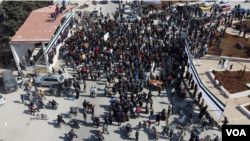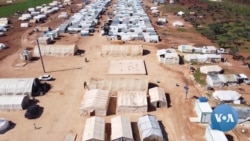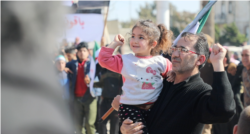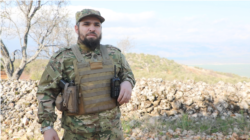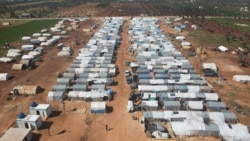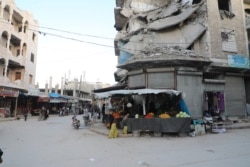On most Fridays, hundreds of protesters gather in “Seven Lakes,” the main roundabout in Idlib, Syria. They dance, sing and chant “Revolution!”
In March 2011, people across Syria held similar demonstrations, demanding the fall of the government they called corrupt and dictatorial. Back then, the protesters were met with violent crackdowns, and the country’s pro-democracy movement swiftly morphed into a bloody revolution.
Now, after 10 years of civil war, hundreds of thousands of people are dead, millions are displaced, and an unfathomable number of people are missing, injured, in jail or deeply traumatized. Syria’s currency has collapsed, and the entire country is mired in economic disaster.
In most of Syria, the war is now over, and the government of President Bashar al-Assad appears to be the clear victor.
But nearly a quarter of the population now lives in Idlib and parts of nearby regions, the last remaining opposition stronghold. And here, the war is at a standstill, with sporadic attacks and no immediate solution.
“Our revolution will remain as long as there are olives and hay,” reads a banner hung in the Idlib roundabout.
Among the protesters is Anwar Alyousef, a father of four, holding 4-year-old Tala in one arm.
“We are still demanding the same things we wanted in 2011,” he explains. “We won’t go home until the head of the regime and the security forces are gone. We don’t care if we are forced from our homes.”
Tala has a cartoon kitten on her pink sweatshirt, and she claps along with the music and laughs.
“She knows that there are rebels and there is a regime that took her village,” says Alyousef. “She can tell you… the revolution has become a culture and our children need to know what happened.”
Trapped
In a nearby marketplace, Shadi Shoayb is less optimistic about the future of the “revolution” as he shops for vegetables for his four children.
In 10 years, the government has been able to reclaim most of the cities, towns and villages that were once under rebel control. Shoayb says he can now barely afford to feed his family and the “freedom” and “justice” that protesters called for in 2011 are nowhere in sight.
“We have lost everything,” he says. “Everything. Our economy, education and justice systems are destroyed.”
Shoayb compares the situation in Idlib to that of Gaza, one of the Palestinian territories. Both have closed borders on one side and conflict on the other. People are impoverished and often in danger, but there is nowhere to run.
Analysts have also made this comparison, pointing out that the group controlling much of Idlib, Hayat Tahrir al-Sham, or HTS, is, like Hamas — the group controlling Gaza — considered a terrorist organization by the United States and other countries.
HTS describes itself as a Syrian nationalist amalgamation of opposition groups with the goal of overthrowing Assad and his international allies.
“We are a revolution, and we want to kick out the criminal gangs,” explains Abu Khaled Alshami, an HTS spokesperson, standing in a field about seven kilometers from the front lines, where government and Russian forces are based.
“We want Assad’s military, Iran’s militias and Russian occupiers out of Syria,” he says.
'Frozen war'
As much as HTS and other rebel groups want the Syrian government to fall, Assad also wants to defeat opposition groups he refers to uniformly as “terrorists."
While fighting has mostly been stalled in the past year, Alshami says he expects Assad’s forces to eventually attempt to retake Idlib and other areas in northwestern Syria under opposition control.
If government forces take over, families in Idlib overwhelmingly say they plan to flee the region. They cannot live safely in an area under government control, they say, and the only “safe” direction to go is north, to the Turkish border.
“If the regime doesn’t leave our village, we won’t go back, even if we have to eat sand,” says Fatoum Alshamali, a mother of four who was displaced three times before moving into a cold tent in the Idlib countryside.
It’s this kind of desperation that could be keeping an all-out war at bay. Turkey already hosts 3.5 million Syrian refugees, more than any other country in the world, and has made it clear it does not want any more.
Turkey also openly supports other key rebel groups in the region and the outcome of any future “thaw” in Idlib, either political or military, is expected to largely depend on the actions of Turkey on the opposition side, and Russia and, to some extent, Iran in support of Assad.
It is widely assumed that Turkey would fight before opening the border to millions more refugees. And in this case, a “fight” could mean war between Turkey and Russia, an outcome that could be disastrous.
But locals say the status quo in the region — with millions hungry, homeless and financially ruined — is also unsustainable.
In the Idlib market, Shoayb says, the decade-old dreams of freedom and justice are now often forgotten, as people work just to survive.
“Do you notice?” he asks. “If you look around, people are suffering so much they appear to have lost their souls.”
Shadi Turk contributed to this report




